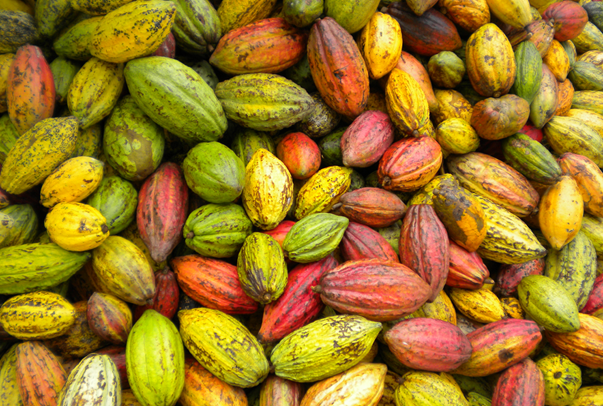Cocoa A driver for development
The social and economic framework for cocoa growing
Cocoa, the principal ingredient in chocolate, is grown in millions of small family-run farms in remote locations around the world. Every year, more than 5 million family farms in countries like Côte d’Ivoire (Ivory Coast), Cameroon, Vietnam and Brazil produce about 4 million tons of cocoa beans.
In parts of the world where opportunities are few, cocoa farming is a vital economic lifeline. Close to 70% of the cocoa harvested every year comes from West Africa (notably Côte d’Ivoire, Ghana, Cameroon and Nigeria). In Côte d’lvoire, cocoa accounts for more than 50% of household income.
The vast majority of cocoa farms are not owned by the companies that make chocolate products or supply cocoa. In some countries, companies that purchase cocoa in bulk are, in fact, prohibited from purchasing cocoa directly from farmers; in other countries, cocoa is purchased from farmers by a national cocoa organization. In either case, it is a complex system of intermediaries that purchases and transports the cocoa from the farm to the port.
Much as it was 100 years ago, cocoa farming remains a small, family enterprise. In West Africa, for example, the average cocoa farm is a 2 to 5 hectare plot, operated by a family that lives on the farm or nearby.

Farming families face challenges that make it difficult to realize the true potential of cocoa farming. The fragile nature of the cacao tree makes it vulnerable to pests and disease: each year, farmers can lose anywhere from 30 percent to nearly their entire cocoa crop. The limited availability of improved seeds or planting material means that farmers are harvesting from trees that are old and produce low yields.
In some regions, limited knowledge of new, more efficient farming techniques also reduces crop yields and incomes. Lack of organization among groups of farmers limits their ability to purchase supplies at a lower cost, access helpful market information or secure a better price for their cocoa. Low literacy rates also hamper farmers as well as the farming community.
Health and social issues impact the community as well, notably a lack of access to quality, relevant education for children on cocoa farms. In West Africa, many cocoa farming families must also contend with HIV/AIDS, malaria and poor quality drinking water on a daily basis.
Despite the challenge, cocoa remains a driver for development
Cocoa has contributed to the development of several countries around the world over the past century. In Côte d’Ivoire alone, cocoa is still the chief source of income for close to a third of the country’s population.
According to the ICCO, world production of cocoa was just under 4 million tons in 2011. Cocoa demand has grown at a steady pace of approximately 3% per year. With increasing demand in rapidly developing economies and emerging markets, it is estimated that a further million ton of cocoa will be needed to meet demand by 2020.
With appropriate action from interested stakeholders, from cocoa producing & consuming countries to farmers, industry and civil society, cocoa can continue to be a force for development in many regions of the world.
Industry is working with farmers to allow them to produce better and more cocoa, and therefore increase their income.
In addition to a host of programmes managed by cocoa and chocolate industry companies, the cocoa industry is collectively engaged in a pre-competitive effort to improve the livelihoods of farmers worldwide, through the World Cocoa Foundation (WCF).
Case Study: the solutions
The World Cocoa Foundation supports cocoa farmers and their families worldwide. WCF programs raise farmer incomes, encourage responsible, sustainable cocoa farming and strengthen communities.
Founded in 2000, WCF is an international membership foundation that promotes a sustainable cocoa economy by providing cocoa farmers with the tools they need to grow more and better cocoa, market it successfully, and make greater profits.
With over 90 members, the World Cocoa Foundation implements, manages, and participates in programs at the grassroots level to help independent family farmers in 15 cocoa-producing nations around the world. The programs teach farmers to grow cocoa more productively and profitably, help farmers establish effective cooperatives and associations to market the cocoa, provide the research to reduce crop loss and improve productivity, promote the inclusion of other crops on cocoa farms to provide alternative sources of income, and expand access to education for youth in cocoa-growing communities.

WCF plays an important role as a convener of stakeholders and facilitates important partnerships for cocoa sustainability. The Foundation works in partnership with companies, governments, private foundations, international institutions, non-governmental organizations (NGOs), academia, and research institutes globally. WCF believes that operating in partnership with these entities optimizes the knowledge and commitment of the partners and maximizes the benefit to farmers and their families.
WCF supports research that fuels innovations and contributes to cocoa sustainability.
WCF can document that more than 500,000 farmers around the world have been directly involved in its programs over the last decade, and some have increased their incomes by as much as 50 percent. But the impact of programs is far greater, thanks to farm cooperatives, models and demonstration projects established based on WCF-supported efforts.
To date 76 million US dollars have been spent on WCF programmes. WCF partners with the Bill & Melinda Gates Foundation, USAID and other development agencies around the world, cocoa research institutes, as well as NGOs in cocoa producing and consuming countries.

The European Cocoa Association (ECA) is a trade association that groups the major companies involved in the cocoa bean trade and processing, in warehousing and related logistical activities in Europe. Together, ECA Members represent two-thirds of Europe’s cocoa beans grinding, half of Europe’s industrial chocolate production and 40% of the world production of cocoa liquor, butter and powder. A majority of ECA members are actively engaged in the work of WCF.
For more information on programmes to improve farmers’ livelihoods:
www.worldcocoafoundation.org
www.eurococoa.com
All pictures courtesy of the World Cocoa Foundation.

